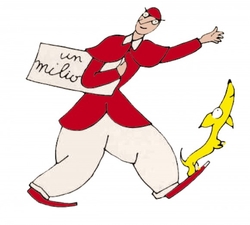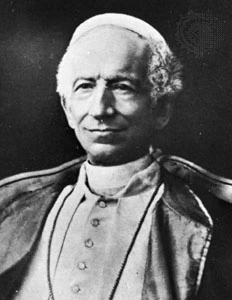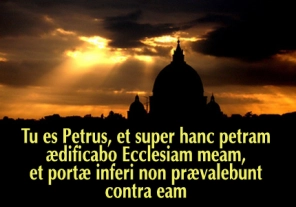Daily Archives: January 6, 2014
Papal Fluff
One of the most salient traits of our Pontiff is the vast amount of hot air he emits. I mean by that those frequent soundbites meaning either nothing, or nothing definable with any precision, or everything and nothing. In Italian: fuffa.
Understandably, the Press – accustomed to deal with people who know what they are saying – tries to give a meaning to what Francis has published, stubbornly faithful to the idea that when one says something, it is because he has an idea or an opinion to convey. In Italy there is a tradition of subtle messages launched to the press, and Vatican prelates use it as much as Italian politicians. What would be inconvenient or too bold to say openly, is said in a veiled manner so that the message sinks in, but the open conflict is avoided. Therefore, the press – particularly the Italian one – always looks for the veiled message. Again: they think that one knows what he is saying. Can one blame them?
I am not sure by Francis this is always the case. My impression is rather that he loves to hear his humble talking so much, that he does not care whether it has a meaning. If it sounds somewhat different, or “pastoral”, or daringly thoughtful, it’s good enough. It will make for fine headlines.
One example from the last days is the rambling of the Pope about the girl complaining of her bitchy lesbian “mothers”. Francis is quoted as follows:
“How can we proclaim Christ to these boys and girls? How can we proclaim Christ to a generation that is changing? We must be careful not to administer a vaccine against faith to them”
This sounds like one talking freely after a very good lunch, and the fourth or sixth after-lunch fernet. The mental association to the vaccine must have sprung to his mind, like those associations freely presenting themselves to our consciousness when we are about to fall asleep, and he just thought the world could not do without this piece of wisdom. What the hell the entire period is supposed to mean has remained, as I write, a mystery.
So the hunt for a meaning started. It started because there isn’t any apparent one, so there must be a carefully hidden one. “What does the Pontiff really say?” could be an interesting blog.
So, there is the admission that there is a “generation that is changing”. But… is it so? No, of course not. Humans never change. Sins, virtues, challenges, are always exactly the same. So he must have meant something else. Perhaps the Pope wanted to say that the times are changing? Possibly. Did he condemn the change? Nope. So the times are changing, but … who is he to judge? Is this what he wants to say?
Than there’s the part with the vaccine. When is it that one administers a vaccine against the faith to a young girl? When he says to her that her “mothers” are bound for hell? Possibly. So one shouldn’t? Very possibly. Well then: does the Pope mean one shouldn’t because it’s too soon, or one shouldn’t because it’s wrong to be “judgmental”? Again: who is he to judge? Is this what he wants to say? This Pope has said so many stupid things so many times, that now they haunt him whatever he says, because every journalist has those “bombs” in mind and thinks they might be exploding again.
Live by the novelty, die by the novelty. This is the Pope of the scandalous statements. Whenever he opens his mouth and says something senseless, of course the hunt for the scandalous statement will start. Don’t blame the journalists, because they do their job. Blame the Pope, because he can’t do his.
Why did Francis not just shut up? Why must this man open his mouth every time his teeth need some air, and some reporter at the Vatican radio or elsewhere must tell the planet Francis’ teeth had a nice breath of fresh air around 2:15 pm yesterday afternoon? Are they unable to understand that the inordinate ramblings of this man embarrass everyone even when he manages not to give open scandal? Or is it so, that the journalists at the vatican radio do “get” it, and the one who does not “get” it is Francis himself?
I can’t imagine the Vatican press office encourages him to such free-wheeling streams of consciousness. The consumptions of tranquillisers over there must be astounding.
The result of all these adolescent shenanigans is that once again, the Vatican press office had to move to deny the Pope is about to say, or supports, something unheard of. And once again, Catholics all over the planet must have wondered whether Catholic rules are so easy to change, or alternatively – and far more accurately – whether something is very wrong with the old man.
The Pope is 77. My suggestion is that he should never give any interview or any speech of sort after lunch or dinner, and as long as digestion is ongoing.
He is enough of a mess when he knows what he wants to say.
Mundabor
The Pope, The Friars And The Singer.

On reflection, he could have been Pope: Luigi Tenco.
Whenever a new text of Pope Francis is published, we are confronted with not one or two carelessly worded phrases, but an entire onslaught of questionable or utterly subversive statements.
The last example is the “Little Monsters” speech, held in November in front of representatives of an utterly failed model now on its way to a fully deserved death: the V II religious.
Francis can’t put three periods in a row without saying something extremely banal, utterly stupid or very disquieting. He does so, because his entire Weltanschauung is just as banal, stupid and disquieting. A sound person will perhaps at times express himself in a not entirely happy manner, but everyone who listens to or reads this person will recognise that he is sound. Not so Francis. Francis says something questionable, or worse, without interruption because his very way of thinking is rotten to the core. His speeches are full of soundbites that mean perfectly nothing – or could mean anything – if read literally, but whose aim is to send a clear message: forget the Catholicism of your grandmother, we are in the age of Francis.
I might leave for another and more detailed post – if time and liver allow – the analysis of the actual bits of Papal madness. Here, let me focus on just three:
1. Mercy and morality.
Francis subverts the very concept of morality, in that he makes of it something clearly alternative to mercy. The consequence of this appalling thinking is clear: in the new Catholicism 2.0, mercy is utterly decoupled from moral. It is, in fact, amoral. Not enough for him to acknowledge that everyone of us is – obviously – a sinner, and the tendency to sin will remain with us as long as we live. No: to him, man’s sinful nature means that mercy, instead of morality, is the answer. When Eugenio Scalfari states that Francis has “abolished sin”, he goes far nearer the real thinking of Francis than the Pollyannas. Francis does not officially “abolish” sin, of course; but when he refuses to acknowledge morality as a value, he surrenders unconditionally and without resistance to man’s sinful nature. To him, sin is the disease and mercy is the cure, period. There is in all this no place for morality.
Possibly, morality gives him goose bumps.
Francis’ aversion to morality is in fact so pronounced that he suggested to his fellow Jesuits to “use mercy, not morality, when they preach”. Look: if morality is to be banned even from preaching, when will the Jesuit ever use it? Shall he hold little sermons in the confessional, perhaps? Or extol the virtues of the moral life to the old people whilst administering the Last Rites to them?
Make no mistake: this Pope is bent on the destruction of Christianity as it has been intended in the last 2000 years. He wants to substitute it – and he repeats it at every turn; so if you don’t get it, it is slowly your fault as much as his – with an alternative vision of the world in which everyone does as he pleases, morality is something for “little monsters”, and mercy is the panacea. This is the reason why he says that God does not do anything more serious than slapping one on the wrist; this is why he believes atheists are saved if they follow their conscience; and this is why – unless there are worse motives – he is so blind toward homosexuality. This vision of the world may sound good and will please those who rebel to God’s laws, but it isn’t even Christianity.
2. The “Little Monsters”
What stated above is very clear in the insisted criticism of Francis for those priests and religious who care for right living and the importance of the moral life. Not for the first time, Francis calls them “hypocrites”, as if doing one’s best to follow the rules necessarily implies they have a very dirty mind and live a life of lies; therefore, their good behaviour itself makes them hypocrites.
I do not know you, but if I heard a parish priest thundering against the hypocrisy of those who strive diligently to follow the rules I could not avoid thinking I am in front of a dirty old man. In exactly the same way as when I hear writers or journalists speak about the “hypocrisy” of traditional, middle-class, Christian values I know these people are certainly not even trying to follow the “small-minded” rules they are criticising, preferring adultery and light drugs instead. “Small-minded rules”. Wait, where have I heard this…
The “new hypocrisy” appear to consist, if you ask the humble Francis, in believing in rules and in our best effort to keep them; in counting rosaries; in having “excessive doctrinal security”; in praying by heart; and in general in doing everything Christians have done for 2,000 years, before Pope Diana The Humble appeared on the horizon.
In short, the “new mercy” is so similar to licence it cannot be distinguished anymore.
3. The “work of art” of priestly formation.
Similarly, Francis stresses that those seminarians – the few that have remained to these old V II nincompoops dancing around like retarded old men in the psychiatric hospital – must be trained intending their formation as “a work of art, not a police action”.
This man sees rules, discipline, proper behaviour as something negative. He talks like an ultra-liberal teacher from some American college campus rather than like a priest, much less a Pope. This is not only the caricature of a religious, but a man you should not allow to get near your children even if he were a layman, a neighbour, a colleague, or a family “friend”. He has no morality, and therefore doesn’t like it, and can’t teach it. He will corrupt your girls in no time with his talk of “no police action”, and education like a “work of art”. Ask yourself whether you would invite him for dinner and expose your family to the influence of a man like this. This is a wolf in wolf’s clothes, and no mistake. Invite him by you and the smell of the favela, the self-satisfied “doubts”, the moral “void”, and the general impious behaviour will enter your house with him. Hey, he might tell you Jesus pretended to be angry. Go figure.
Look at the Jesuits to see where such (degenerate) “art” leads to. Look at the Pope himself, questioning the obedience and humility of the Blessed Virgin! He is the product of such “art” himself.
——————————————-
Francis reminds me more and more of Luigi Tenco, an Italian singer of the Sixties and the perfect embodiment of the “rebel” generation of those years. Tenco composed a song titled “Ognuno e’ libero”, based on the words “ognuno e’ libero di fare quello che gli va”, or “everyone is free to do what he pleases”.
Add a sprinkle of mercy, a lot of pauperism and some (strong) smell of Favela, and you have Pope Francis’ Pontificate explained.
Luigi Tenco practised what he preached and, in a bout of worse than usual self-centred infantilism, committed suicide because he was not happy with the jury and the population at large for his treatment in a famous televised song contest.
No, seriously: he killed himself for that. But hey, “ognuno e’ libero…”.
Poor idiot.
Had he entered a Jesuit seminary instead, by now he could have been Pope.
Mundabor





















You must be logged in to post a comment.